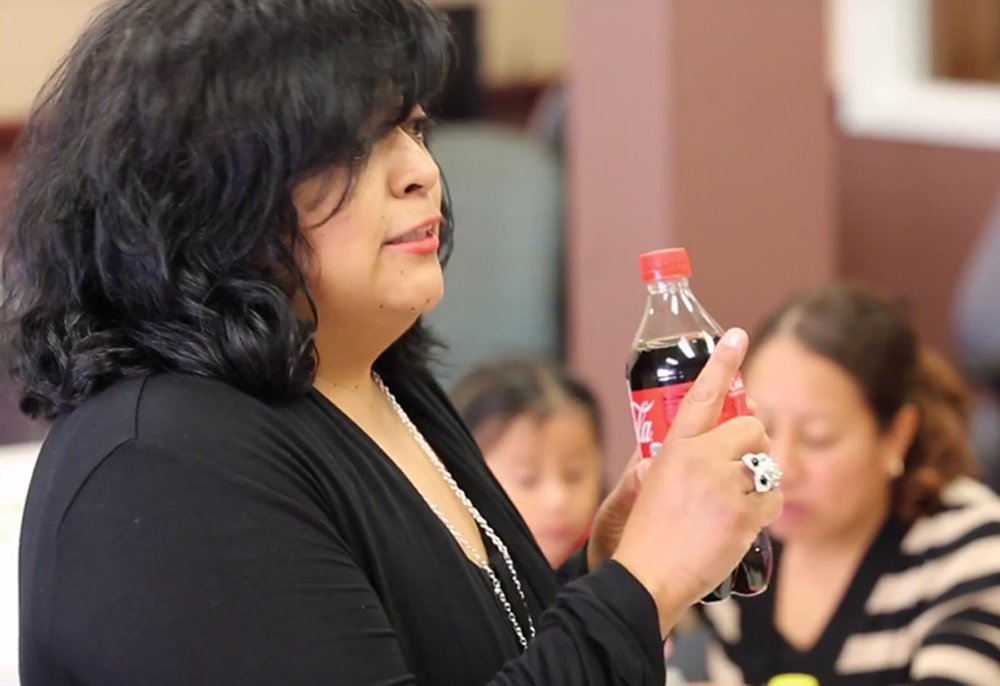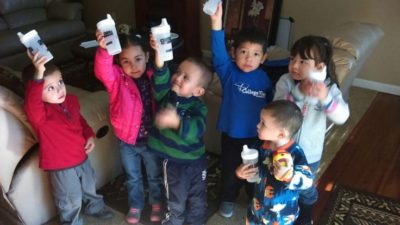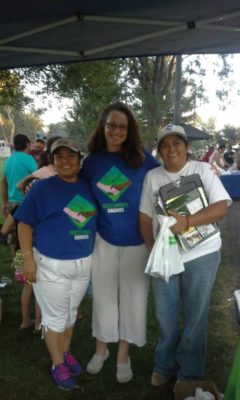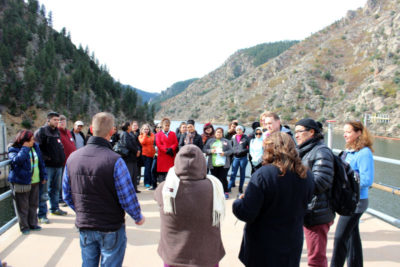Share On Social!
Gaby Medina, a mom and health educator in the neighborhood of Westwood, in Denver, Colo. (79.36%), didn’t have a lot of faith in the safety of local tap water when she arrived here from Mexico.
Much of Denver’s foreign-born population similarly distrust the safety of tap water.
However, Gaby eventually learned to trust the water.
She then took a big step to make sure her family, friends, and fellow Latino residents across the community understand that tap water is far safer, healthier, and more affordable than sugary drinks.
Is tap water safe?
Gabriela “Gaby” Medina is your average Latina mom who wants to help her 10-year-old daughter and her family live happy, healthy lives.

In Mexico, tap water is not always safe to drink.
“Initially, yes, I was hesitant [about drinking Colorado tap water],” Medina said in a recent article.
Hher dentist actually urged her to encourage her kids to drink tap water to help their teeth. She started drinking the tap water herself and realized it was safe and healthy to drink.
Medina had begun working in Westwood as a volunteer under Westwood Unidos, a group of organizations and residents that work to unite community-led efforts to provide a safer, healthier place for residents in Westwood and south Denver.
In the predominately Latino neighborhood of Westwood, many Latino kids face the combined risk of obesity (and associated diseases) and tooth decay.
Westwood is the second-most obese neighborhood in Denver, according to The Denver Post.
Studies show that Latino kids are more likely to drink more sugary beverages than their white peers at all age levels—and with each extra sugary drink, their risk of becoming an obese adult jumps to 60%.
In addition, Dr. Patty Braun, a pediatrician, and oral health specialist with Denver Health explained an article that many Latino kids she sees in her clinic drink more sugary beverages, and are more likely to have cavities than non-Latino kids.

“Over half of kindergartners have cavities,” Braun told Colorado Public Radio. “If you’re used to living in a place where you would normally not want to drink the water because it is not safe then that’s what you’re going to bring over to any other new setting that you live in.”
Rachel Cleaves, coordinator of Westwood Unidos, who was already working to engage activists in health and safety projects in southwest Denver, also saw the need for healthier beverage consumption.
Cleaves said many parents rely on sugary drinks, such as juices, for their children.
“A lot of people aren’t aware of this problem,”
Cleaves said. “Thirty thousand children in Colorado have untreated tooth decay and Hispanic children have the highest rates.”
How could local advocates like Medina and Cleaves push local tap water, reduce obesity, and boost oral health?
A campaign to promote water
In January 2015, Cleaves received a fortuitous call.
Delta Dental of Colorado Foundation (DDCOF), a non-profit that aims to prevent childhood tooth decay in the area, was looking to start a public health campaign on oral health.
Since 2013, DDCOF worked with LiveWell Colorado, a local health-promotion group, partnering together for other healthy initiatives that included oral health in the area.
In 2015, DDCOF and LiveWell decided to work together with various groups—including Bright By Three, Southeastern Colorado Area Health Education Center, Qualistar Colorado, Healthier Colorado, Oral Health Colorado and Children’s Museum of Denver—to launch a new sustainable community organizing initiative known as, Cavities Get Around Southwest Denver.
Wyatt Hornsby, DDCOF’s director of public will-building, explained that the initiative goes far beyond encouraging kids to brush their teeth; the initiative organizes families and local leaders for policy change in schools, childcares, and public places.
LiveWell directed DDCOF to Westwood Unidos to help bring them into the partnership as well, calling Cleaves in January of 2015 to explore common values and goals.
They decided to partner for the health campaign, “Cavities Get Around,” to push water and boost oral health.

On March 1, 2015, after months of discussing and planning the campaign, Westwood Unidos signed a contract to partner with DDCOF.
“We wanted a direction that would bring lasting change and could be copied in other places,” Hornsby said.
In the next month, DDCOF and Westwood Unidos worked with HealthCare Research Inc., to conduct focus groups to help understand the challenges and opportunities within the community.
“[Delta Dental] wanted it to be more of a community-led effort, where it wasn’t just a public health organization coming into their neighborhood and telling them what to do, but rather that there was more of an integration into getting to know the community, and that community members had some say about how the program would run,” Cleaves said.
Cleaves and the research team found through the focus groups that many Latino families are unsure of drinking the tap water in the area and choose fruit juices or other sugary options like sodas for their kids.
“A big challenge to our work is a common belief among immigrant populations that tap water isn’t safe. We’re working hard on this issue,” Hornsby said.
Previous successful health campaigns required grassroots outreach, Cleaves said.
“We did realize though that it [the campaign efforts] had to start with education, cause a lot of people in the community had lack of information about certain things,” she said.
But how would they reach out and educate the residents of Westwood?
Adding promotoras, like Gaby, to the campaign
The team believed Latina health educators, or promotoras, could play the main roles in delivering campaign’s water and oral health messaging, to encourage local uptake and change.

“We’ve found that trusted messengers really help families understand that the tap water is safe to drink and healthy for kids,” Hornsby said.
The promotoras would deliver health messaging primarily at schools, and also other locales.
From May through June 2015, Delta Dental worked with Westwood Unidos and other partners to develop school toolkits with targeted messaging to Latino kids and parents. Cleaves also established a partnership with Denver Water, a public agency and Colorado’s oldest and largest water utility, to develop ways to inform Westwood residents that their tap water is safe to drink.
In June 2015, Cleaves posted a position a health educator/promotora who would push tap water.
Medina applied for the position.
She believed that she could help her community see that cavities are preventable, and drinking more water was a healthy choice.
“At times I believe it is a little difficult to change behavior because it is a custom from the past from someone in the family like grandma, but now I have seen the problems like obesity, diabetes, cavities and hyperactivity in our kids,” Medina said. “These diseases are present at a young age.”
Westwood Unidos hired Medina along with Gloria Sanchez in June 2015.
In August 2015, Cleaves also developed a coalition—teachers, administrators, school nurses, the mayor’s office, and the health department—to help guide the campaign and spread the word.
Cleaves and the team continued to connect with local schools, churches, and the community to plan educational workshops.
“We try to explain to them [the schools] that it doesn’t end at the mouth, that oral health affects the whole Childs’s life because a child with untreated tooth decay is four times more likely to have a lower GPA,” said Cleaves.
In September 2015, Mile High Montessori became the first school to grant permission for the promotoras to deliver water safety presentations and the Cavities Get Around campaign.
Cleaves along with the promotoras, Medina and Sanchez, host parent workshops, staff workshops, and hang 3D graphic displays in all the schools they visit. They also offer the schools free water dispensers and water for their classrooms along with children’s books, and sugar boards that show how much sugar is in different beverages.
“We’re holding workshops for parents, educators, and local leaders,” Hornsby said. “We’re helping schools assess kids’ access to water. We’re building public will.”
More Latino parents choose water for their kids
Since September, more schools have come on board with the campaign.

“I would say about 90% of the schools take the toolkit and implement it,” Cleaves said.
Medina also has been speaking to her community in Westwood, providing resources and education.
She explained that at first many people were afraid of drinking tap water, and preferred drinking bottled water, thinking that it was safer or had more flavor. But after talking with many of the parents about the safety of the water, they are increasingly heeding the water messages and making changes.
“People have taken it well,” Medina said.
Parents and teachers who complete the workshops are taking their knowledge to their children and students to “change their habits,” Medina said.
“Many parents don’t know how to take care of their kids’ teeth, and with this campaign, I am helping them learn, this is what motivates me to work,” said Medina.
The numbers agree.
63% of parents said their children now drink tap water on a regular basis—a 22-percentage-point increase from 2014—according to a 2015 statewide survey by DDCF among 600 participants.
The survey also showed that fewer children are drinking juice during the day.

“This is encouraging because we know juice can have as much sugar as soda,” Hornsby said. “We know the most important measure will be statewide data showing fewer kids with tooth decay.”
In October 2015, Westwood Unidos used their partnership with Denver Water to invite interested community members on a walking tour of the facilities, explaining where the communities’ water came from and the safety of the fresh mountain tap water.
Plans for 2016 will continue the workshops and focus on school wellness policies to limit sugary snacks and beverages, not just among parents.
“We will achieve success when … water is the default drink in schools, sports leagues, and other community places, like the workplace,” Horsnby said. “It’s no longer OK to serve children sugary drinks unless for special occasions.”

“Success also means the movement has reached and engaged policymakers, voters, community and business leaders, faith leaders, health providers and educators.”
DDCOF and Westwood Unidos plan to expand the campaign to two new zip codes: 80204 and 80223. Hornsby explained DDCOF has a growing list of engaged partners that are discussing children’s health and policy change and they are happy to share their model with other areas of the country.
“Delta Dental has told us they’re in it for the long run,” Cleaves said.
Medina now says she tells everyone that water is safe, thanks to the campaign her favorite way to drink water now is just plain water with ice, but she also likes fruit infused water.
Even Medina’s daughter now really enjoys making lemonade, but made with only fresh lemons and water—no sugar added.
“This [campaign] is a great help, it is a simple solution,” Medina said. “Cavities are 95% preventable!”
By The Numbers
74
percent
of Latino kids have had a sugary drink by age 2 (vs. 45% of white kids)
This success story was produced by Salud America! with support from the Robert Wood Johnson Foundation.
The stories are intended for educational and informative purposes. References to specific policymakers, individuals, schools, policies, or companies have been included solely to advance these purposes and do not constitute an endorsement, sponsorship, or recommendation. Stories are based on and told by real community members and are the opinions and views of the individuals whose stories are told. Organization and activities described were not supported by Salud America! or the Robert Wood Johnson Foundation and do not necessarily represent the views of Salud America! or the Robert Wood Johnson Foundation.



